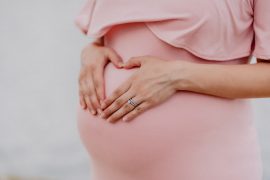If you are not careful to observe proper hydration practices during your normal day to day routine, it is easy to find yourself dehydrated – it happens to the best of us. Dehydration takes place when your body is losing more fluid than it is being provided. When you are sweating more than usual, have been sick, or are currently pregnant, it is possible to dehydrate more quickly than usual. This highlights the importance of drinking adequate amounts of water during pregnancy, if only to alleviate common problems, like tiredness and constipation, associated with being pregnant.
Proper Pregnancy Hydration
When you are pregnant, it’s important to remain hydrated. During the various stages of pregnancy, the minimum amount of water ranges from six to eight 8oz glasses of fluid per day. Typically, most drinks count toward your daily water allowance, although caffeinated drinks should be limited throughout pregnancy. Additionally, drinks high in sugar are not considered part of a healthy diet, especially for pregnant women. Some healthier drink options include:
- Purified or Filtered Water
- Fruit Infused or Herbal Tea (suitable for pregnancy)
- Fresh Fruit Juice
Try to drink 1.6 litres of fluid a day. Carrying a one litre bottle of water with you allows you to keep track of how much you are drinking throughout the day.
The Importance of Drinking Water Daily
Practicing carrying around a 32 ounce water bottle will help you drink adequate amounts of water throughout the day. By maintaining an appropriate water intake, you enable your internal organs to operate at optimal levels for the regular removal of waste. Take your kidneys for example, which utilize urine output to flush away various types of waste. By doing so, your chance of suffering with a kidney infection, urinary tract, or even a bladder infection are significantly reduced. Take our word for it when we say you definitely don’t want to deal with that during your pregnancy.
Solid waste also requires proper hydration to be flushed away on a daily basis. Bowel movements are dependent upon water for ease of passing, whereas water has the ability to soften stool. Pregnant women suffer from bathroom issues more than any other individual – so allow water to be your solution! Additionally, you’ll be a decreased risk of developing hemorrhoids during pregnancy.
Why Should I Take Care to Remain Hydrated During Pregnancy?
During pregnancy you are no longer eating and drinking for one, you’re doing so for two. The same goes for the process of excreting – you’ve got two bodies to maintain now. Although this may be a personal subject, you have to ensure your organs are up for the task of cleaning up after two bodies. By drinking adequate amounts of purified water, you are poised to enable solid wastes to move on down the line with ease. Digestion will also improve, as water plays a vital role in absorption, in addition to waste management.
UTIs
Does the idea of avoiding UTIs during pregnancy sound good? Be careful to drink enough water in order to dilute your urine, which enables proper flow to keep the bacteria at bay. Drinking enough water also keeps your urine diluted, which not only keeps things flowing but also keeps UTIs at bay (urine that hangs out too long in your bladder can become a breeding ground for infection-triggering bacteria), as well as bladder infections and kidney infections (which are types of UTIs).
Overheating
Women experience a lot of hot flashes during pregnancy. It’s as though someone turned the heat on and ripped the knob off. If you are struggling to find a way to cool down, drinking enough water may do the trick. Your body will be enabled to run smoothly, thereby lowering your inner thermostat for a break from the heat through sweat.
Fatigue
Fatigue can hit hard during pregnancy, but water is great at combatting bouts of fatigue. Did you know that exhaustion was one of the first symptoms of dehydration? Additionally, you may face symptoms such as headaches, and edema. Water flushes away sodium to minimize swelling in the feet and ankles.
Dehydration Signs & Symptoms
Understanding the signs of dehydration serves as the first step to avoiding it altogether. Once you begin to feel early symptoms, you can take proper steps in stopping it, or seeking medical attention when necessary. Some of these symptoms may look like:
- Extreme thirstiness
- Less urine output
- Darker colored urine
- Exhaustion, fatigue, confusion, and even dizziness
Once you become severely dehydrated, there’s no room for messing around. If you are pregnant, and experiencing any of the following symptoms, please don’t hesitate to call your doctor or go to the ER:
- Inability to keep fluids down
- Feeling rather sleepy or disoriented
- Experiencing bloody or black bowel movements
- Struggling with diarrhea lasting beyond 24 hours
